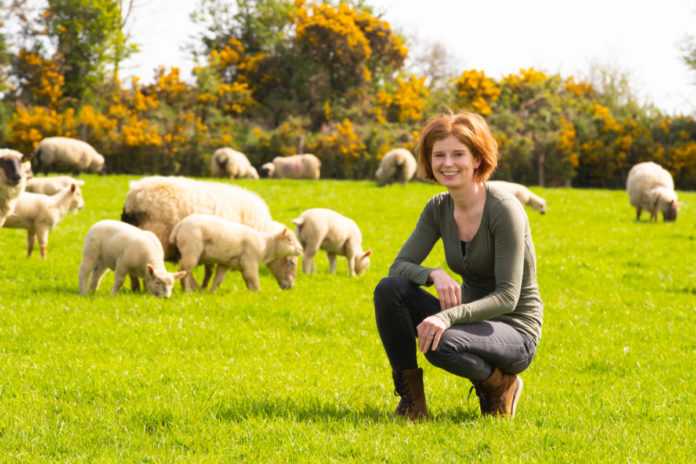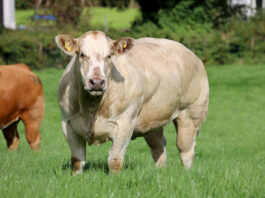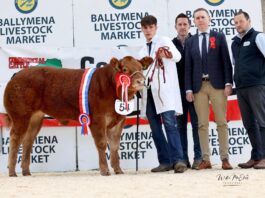Ciara Kinsella juggles life as a part-time farmer, part-time vet, mother, and wife.
Together with her mother, Frances, and husband, Liam, she runs Tykillen Farm, which is situated along the banks of the river Slaney in Co. Wexford.
The couple have two young children; Cathal (3), and Tadhg (1), who also share their passion for farming.
After Ciara’s father took voluntary redundancy from his job in the 1980s, her parents began farming and overtime, grew their enterprise to 50-acres and approximately 200 ewes.
“My earliest farming memories are of lambing time, which to this day, remains my favourite time of the year,” she explained to Catherina Cunnane, editor of That’s Farming.
“As a child, it was a really magical time of year with the arrival of hundreds of newborn lambs within a couple of weeks of each other.”

Mixed enterprise
Tykillen Farm, which she runs in partnership with her mother, is a mixed enterprise encompassing sheep, bees, horses and a 15-acre forestry.
Their sheep enterprise currently comprises 110 Belclare-cross ewes which they lamb down in late February/early March.
The Bord Bia Lamb Quality Assurance Scheme members produce grass-fed lambs which are sold directly for slaughter.
They also produce top-quality Irish sport horses for the professional and amateur market – several of which have experienced success with subsequent owners, going on to compete up to European Championship-level.
“Prior to having kids, I did quite a bit of competing myself, showjumping up to Grand Prix level,” Ciara revealed.

Farming in a sustainable and environmentally friendly way
They aim to farm in a sustainable and environmentally friendly way, supporting natural flora and fauna.
Measures include limited fertiliser use, through avoiding overstocking and by making use of frequent soil testing, large areas of permanent pasture and planting over one-hectare with wildflowers and corn to support birds and insects.
They also have a wildflower meadow planted, while many bird and bat boxes are sited around the farm as well as several sand mounds to support solitary bees.
The Origin Green and GLAS participants have also erected an owl box this year and have established hedgerows.
Their recent farm diversification into beekeeping and production of raw honey is a project which supports their ethos. They currently have eight hives of bees and hope to sell their honey after it is harvested in late summer, on their online shop, which they are currently developing.
They will also be selling a range of homemade beeswax products such as soaps, salves, lip balm and candles.

Veterinary
Due to the size of the family farm, full-time farming was never going to be an option, Ciara explained.
“Veterinary appeared to be quite similar in job description – caring for animals, working outdoors, and the variety involved in the job were all aspects that really appealed to me.”
She graduated from University College Dublin (UCD) in 2012 with a degree in veterinary medicine and then spent four years in a full-time position in PetsFirst, a practice close to Enniscorthy.
In 2016, she moved closer to home taking up a part-time role at The Veterinary Hospital, also known as O’Shea, Bramley, and Breen, in Wexford town.
“I feel lucky to work there with such a great team of people. I am predominantly involved in small animal work and no two days are the same.”

For the most-part, she finds veterinary rewarding, but admitted that it can be quite a challenging career also.
“Small animal clients can be hugely attached to their pets, and it can be extremely draining emotionally when you have to deliver bad news.”
She said it can also be very difficult to accept that sometimes even with the best care, treatment, and surgical protocols, some animals will not pull through.
“It is easy to start doubting yourself and your judgement and start questioning what could have been done differently to change the outcome.”
“I am fortunate to work in a very supportive environment, something I feel is hugely important in dealing with these challenges. added Ciara, who is employed by the DAFM as a temporary veterinary inspector in ICM Camolin.
Juggling many hats
Ciara has reduced her working hours quite significantly since the arrival of her children. “They will only be young once and I am trying to enjoy this period of our lives as much as possible.”
“My mother is a fantastic help in providing childcare for the kids, while I am working. My bosses have been brilliant in facilitating my part-time work.”
“Compared to many other careers, veterinary most definitely included, I do feel that farming is a lot easier to balance with family life.”
“There are many jobs the kids can accompany me on, and the freedom of being able to manage your own time is also a huge benefit.”

Women in ag
Ciara said she has never felt discriminated against or treated differently as a farmer because of her gender. “If anything, I would say other farmers can be more open and chatty as it is quite unusual to see a female face in farming circles.”
As a veterinary surgeon, her experience has been different. “Interestingly, any negativity towards me as a female vet has always come from female as supposed to male clients.”
“It is not that unusual for female clients, even new ones, to ask our receptionists if they can see a male vet. I do not know why this is, but it can be disheartening at times. I think women can be very hard on other women in general.”
She believes that progress has been made in recent years in increasing the recognition given to women both at farm and industry-level.
“I have noticed that women can be very poor at recognising their own value to the farm and will say they ‘help out a bit’ when in reality, they play a vital role in the day-to-day running of the farm.”
“I also think more needs to be done at secondary school-level to encourage more females to study agriculture-related courses, setting them on a path into the industry,” added Ciara, an ACORNS participant.

Future
Looking ahead, the family’s attention is turning more to their bee-keeping enterprise, having recently converted an old outhouse into a honey room.
Here, they will extract and jar their honey and hope to have this project completed ahead of this year’s harvest. “We plan to expand hive numbers over the next couple of years, building up to about forty hives.”
With the correct marketing strategy, they hope that this will provide a decent income stream for the farm in the autumn months.
“I feel very fortunate in all of my roles and I am very positive about the future of Tykillen Farm.”
“There is a sense of pride in essentially taking stewardship of a family farm, building upon the work done by the previous generation with the hope of being able to hand it over to the next generation,” she concluded.
Information
Follow Tykillen Farm on Facebook, Instagram or see their website here.
To share your story, email – [email protected]



